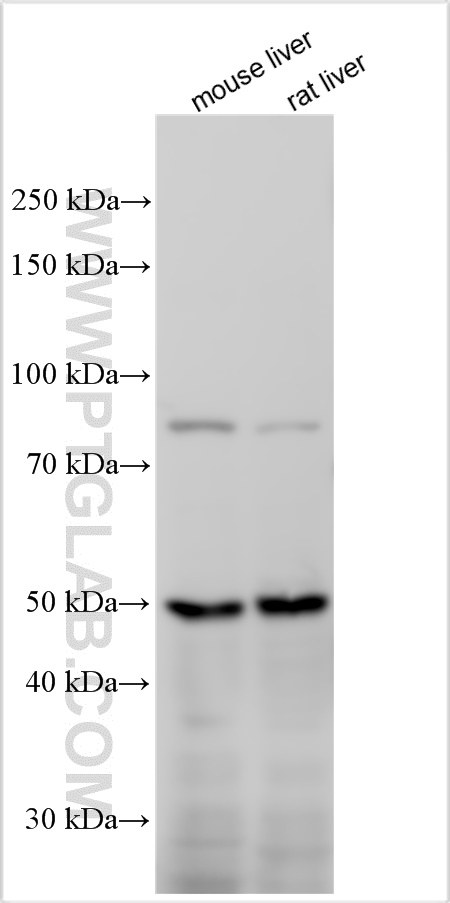验证数据展示
经过测试的应用
| Positive WB detected in | mouse liver tissue, rat liver tissue |
推荐稀释比
| 应用 | 推荐稀释比 |
|---|---|
| Western Blot (WB) | WB : 1:1000-1:6000 |
| It is recommended that this reagent should be titrated in each testing system to obtain optimal results. | |
| Sample-dependent, Check data in validation data gallery. | |
产品信息
25434-1-AP targets KREMEN1 in WB, ELISA applications and shows reactivity with human, mouse, rat samples.
| 经测试应用 | WB, ELISA Application Description |
| 经测试反应性 | human, mouse, rat |
| 免疫原 | KREMEN1 fusion protein Ag22092 种属同源性预测 |
| 宿主/亚型 | Rabbit / IgG |
| 抗体类别 | Polyclonal |
| 产品类型 | Antibody |
| 全称 | kringle containing transmembrane protein 1 |
| 别名 | Dickkopf receptor, KREMEM1, KREMEN, Kremen protein 1, KREMEN1, KRM1 |
| 计算分子量 | 473 aa, 52 kDa |
| 观测分子量 | 50 kDa |
| GenBank蛋白编号 | BC063787 |
| 基因名称 | KREMEN1 |
| Gene ID (NCBI) | 83999 |
| RRID | AB_3669475 |
| 偶联类型 | Unconjugated |
| 形式 | Liquid |
| 纯化方式 | Antigen affinity purification |
| UNIPROT ID | Q96MU8 |
| 储存缓冲液 | PBS with 0.02% sodium azide and 50% glycerol , pH 7.3 |
| 储存条件 | Store at -20°C. Stable for one year after shipment. Aliquoting is unnecessary for -20oC storage. |
背景介绍
Kringle containing transmembrane protein 1 (KREMEN1, also known as KRM1, ECTD13, and KREMEN) is a transmembrane receptor located in the membrane. During the development of various organs, including the nervous system, limbs, and liver, KREMEN1 synergizes with the Dkk proteins to inhibit Wnt signaling (PMID: 18505822). KREMEN1 has been reported as a tumor suppressor, preventing cancer cell survival in a ligand-poor environment (PMID: 31069116). Variations and mutations of KREMEN1 have been associated with ectodermal dysplasia and Hand-foot-and-mouth disease (PMID: 34028942; 31911601).
实验方案
| Product Specific Protocols | |
|---|---|
| WB protocol for KREMEN1 antibody 25434-1-AP | Download protocol |
| Standard Protocols | |
|---|---|
| Click here to view our Standard Protocols |
